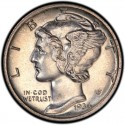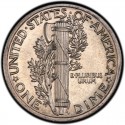- United States Coins
- Mercury Dimes
- 1936 Mercury Dime
1936 Mercury Dime
Coin Info
Production of 1936 Mercury dimes far exceeded 100 million pieces, but that wasn’t the only headline for the 10-cent coin of 1936. That was also the year the first modern proof coins were struck at the U.S. Mint, which included the striking of proof Mercury dimes as well. With a large number of regular-issue Mercury dimes rolling out of the U.S. Mint in 1936, the date remains common to this day, and is easily obtainable for coin collectors working with virtually any type of budget.
Here’s a breakdown of the mintage figures for 1936 Mercury dimes:
-
1936, 87,500,000 minted; $5.00
-
1936 proof, 4,130; $625
-
1936-D, 16,132,000; $5.50
-
1936-S, 9,210,000; $5.50
*Unless otherwise noted, values are for coins in Very Good-8.
In general, the only challenges in buying 1936 Mercury dimes come for coin collectors who want uncirculated or proof examples of the date. Not that the values are off the charts for any of the three regular-issue 1936 Mercury dimes in uncirculated grades – any of the three can be bought in MS-65 for well under $100. But, if you want fully split band (FSB) Mercuries from that year, you may have a little difficulty in finding those pieces, as FSB Mercury dimes are generally much more difficult to find than regular uncirculated pieces, which tend not to show fully struck horizontal lines in the bands surrounding the fasces on the reverse of the coin. If you’re buying proof Mercury dimes, try your best to avoid cloudy-looking specimens; if you find an example with cameo devices and flashy fields and can afford such a piece, by all means buy it, as 1936 proof coins of that caliber are a rare breed indeed.
1936 Mercury Dimes for Sale
Other Years From This Coin Series:
-
{{#owner}}
-
{{#url}}
{{#avatarSrc}}
{{name}} {{/url}} {{^url}} {{#avatar}} {{& avatar}} {{/avatar}} {{name}} {{/url}} - {{/owner}} {{#created}}
- {{created}} {{/created}}


